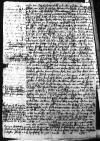Wir habenn genugsam aus Ewer Herlichkeit ⌊⌋ vorstanden, was die aus den zeitungen und warnungen, so ⌊furstliche durchlaucht⌋ aus ⌊Deutzschlanden⌋ zukommen, / / die anslege des ⌊deutzschen meisters⌋ und vornemen widder diss landt botreffende, / vornomen. Lassen uns auch daruber Ewer Herlichkeit bodencken gefallen, / das wir eben, wie Ewer Herlichkeit zu gemutte fhurenn, / die stadt ⌊Dantzig⌋, hiein das f..., ihre ...ge in gutter acht haben / , damit sie nicht ubere...let, / dieweil der angreif, / welches Got lange vorhutte, / die vieleichte, / wo etzwas geschen solte, / am ersten treffen wurde, / zuvorwarnen, / das d... Ewer Herlichkeit, / die gedochter stadt nahenter den wir gesessen, / und ehe den unser schreiben an sie gelangt, / wirdt kunnen am bokuemesten bei ihnen ausrichten, / und solche ferlickeit, die vorhanden ist, an kunndenn. Gleicher gestalt wolte auch Ewer Herlichkeit mit dem grosmechtigenn hern ⌊pomerelischer wojwoden⌋ / wegen der zerung handeln, / und bei seiner herlichkeit anhalten, / das die zusamen getragen, / und dem hochwirdigen hern ⌊Tidemanno⌋, culmischen bischofe, und Ewer Herlichkeit uberantwurt werde, / worin wir uns vorshen, ehr nichts nachlassen werde, / und wir gut auch derhalben ⌊⌋, dieweil ehr solchs auf sich gennumen. Nachdem auch von den grosenn stedten das meiste ist abgelegt worden, / czweifeln wir nicht, / sie auch das kleinste, / den huben groschen, zugeben / sich nicht bosweren werden, / davon sie sich den wie ausgeschlossenn habenn, darin dennoch Ewer Herlichkeit sie zuvormanen nicht nachlassen wollt. Wir nemen auch zu sunderen wolgefallenn an, / und bodancken uns freuntlich kegen Ewer Herlichkeit, / das die uns von ihrem frischem sthut pferde thut anzeigenn, / welchs wir gerne angenomen , / wo Ewer Herlichkeit uns davon was zeitiger hette meldung gethan. / Nu aber haben wir unser stut vor dismol mit solchenn pferden / dermossen vorshen, / das wir der keine mer bodurffenn. Sunst wolten wir ane das gerne Ewer Herlichkeit mit einem jungen folen / vorsorget haben, / wir seindt aber also mit pferden in kurzer zeit zurucke kommen, / das wir nu daran sein mussen und darzu trachten, / damit wir widder junge pferde zuzihen, derwegen wir den dis ihar algereit czwei hundert thaler von 8 pferde geben . / So haben wir nichts guts / fast in allen unsern wagen geschirren, / sunder eitel, alte, abgetribne geule, / in deren stelle wir gerne / die jungen / aufgestalten pferde, / die zu fernen weg / und grossen tagreiss nicht tuchtig, / mit der zeit gebrauchen wolten. Czu dem hat uns czuvor der hochwirdige in Got her ⌊Tidemannus⌋, bischof zu ⌊Colmenshe⌋, , unser freuntlicher lieber bruder, / umb pferde zu dem zuge angelanget, / womit wir den sein libde nicht vorlassen kunnen. Bitten derwegen freuntlich, / Ewer Herlichkeit wolte disse unser notige entschuldigung, / dadurch wir dersulben zuwilfharen gehindert worden, vor dismol im besten vormerken und annemen. Und wo Ewer Herlichkeit , die wir gotlichen genaden mit langweriger gesuntheit und wolghen bovelen, / uns was rait ... pferden, sunderlich aber wagen pferden, / wuste zuzuweisenn, / thete uns die daran einen sunderen gefallen.

